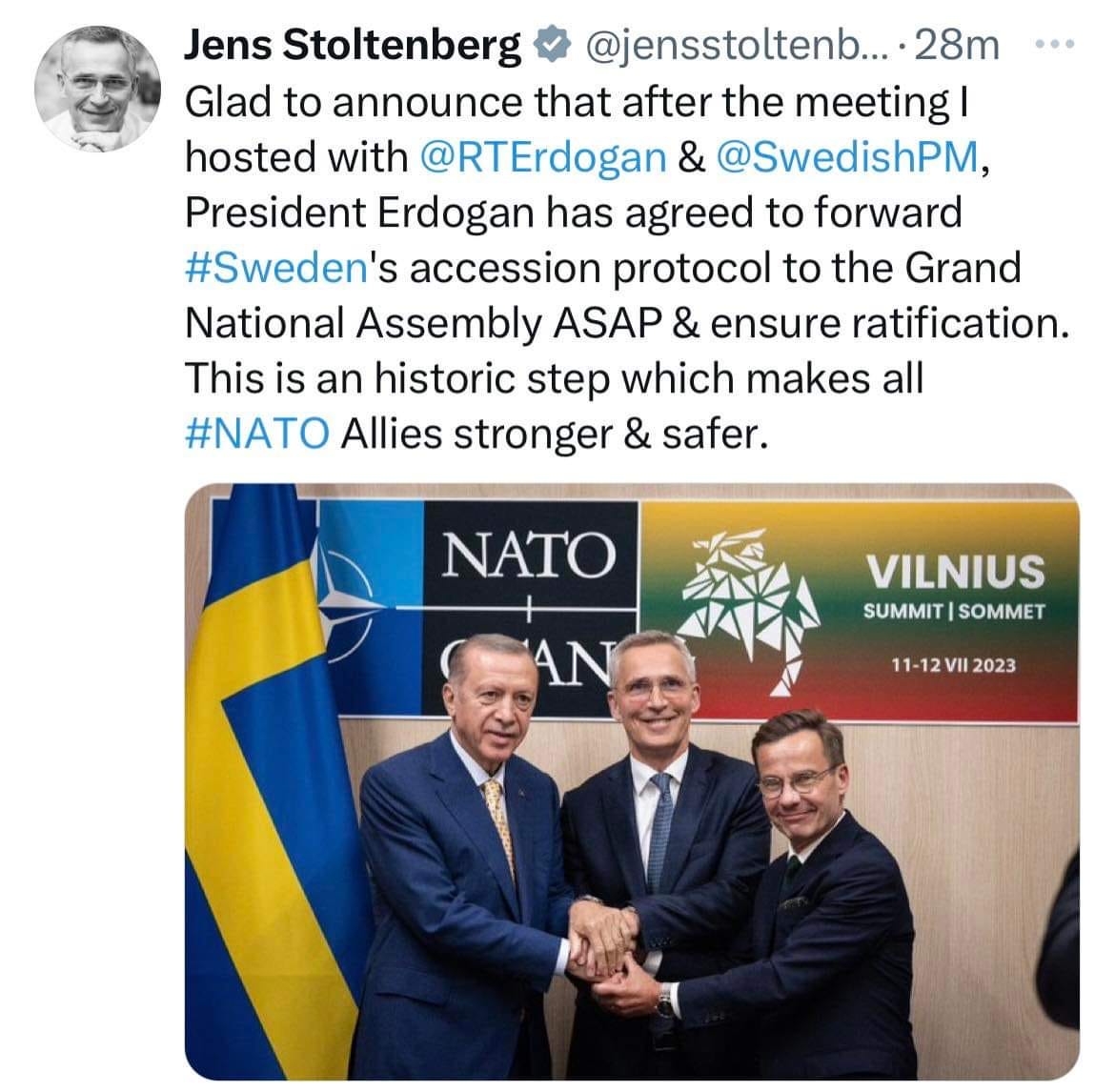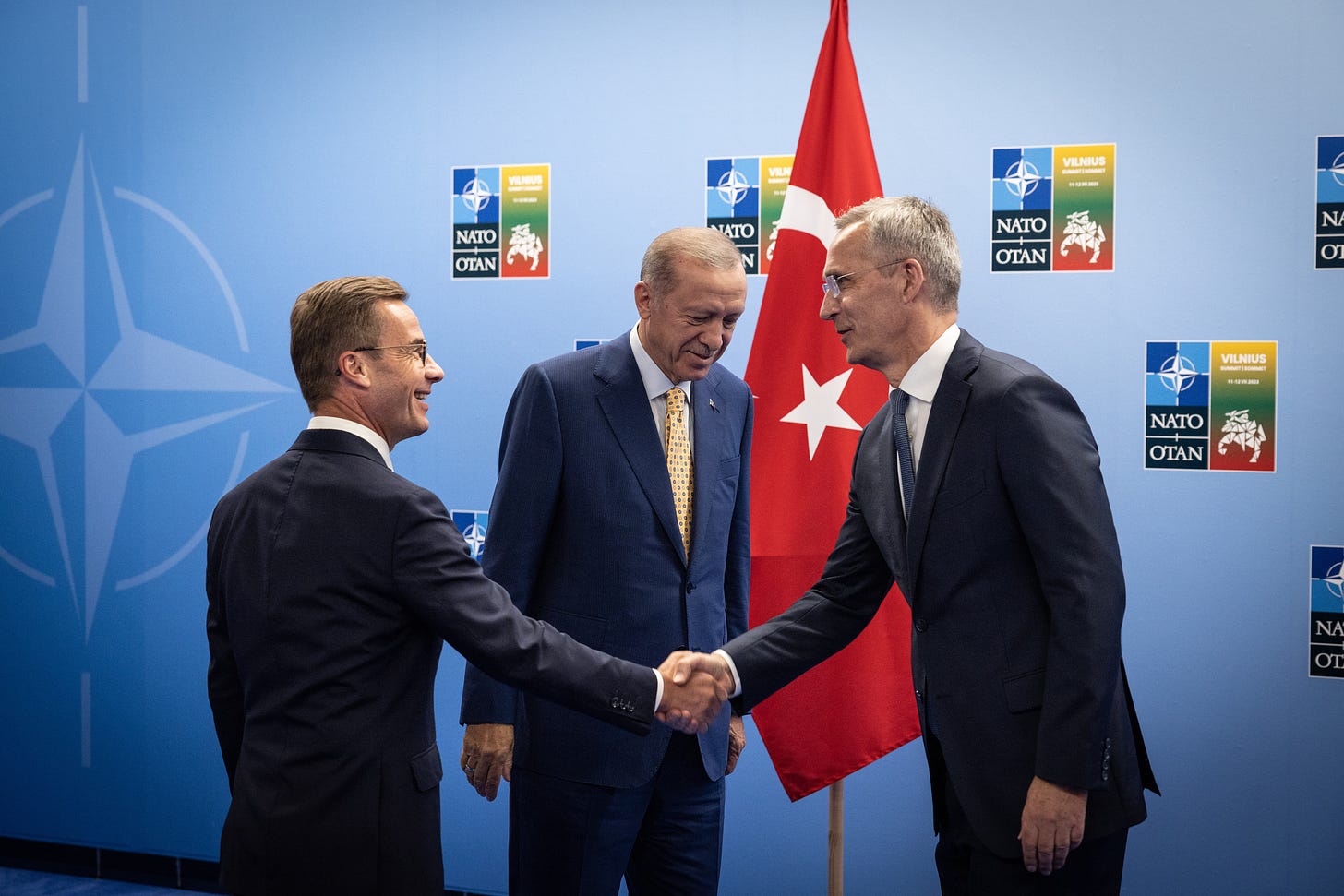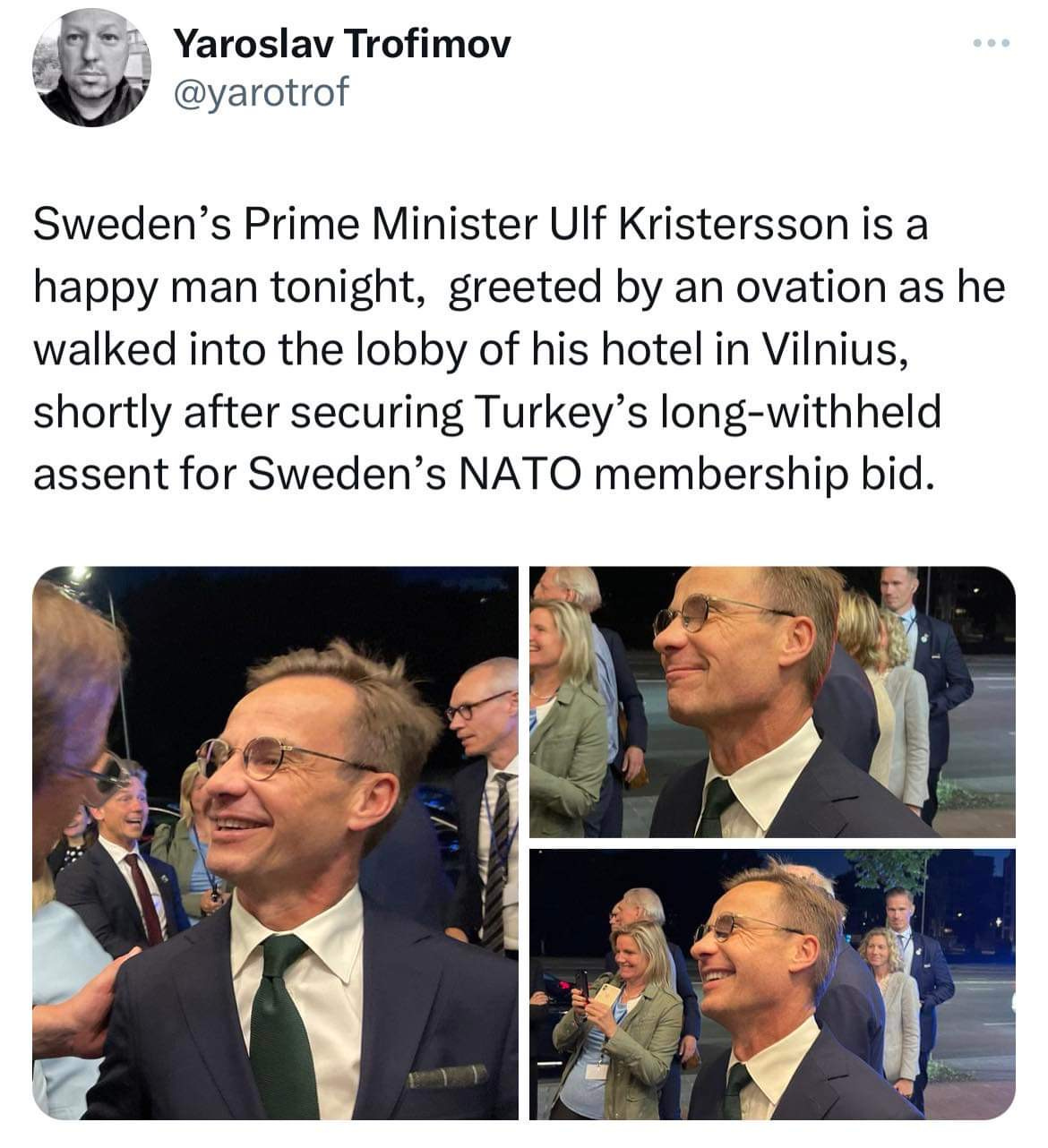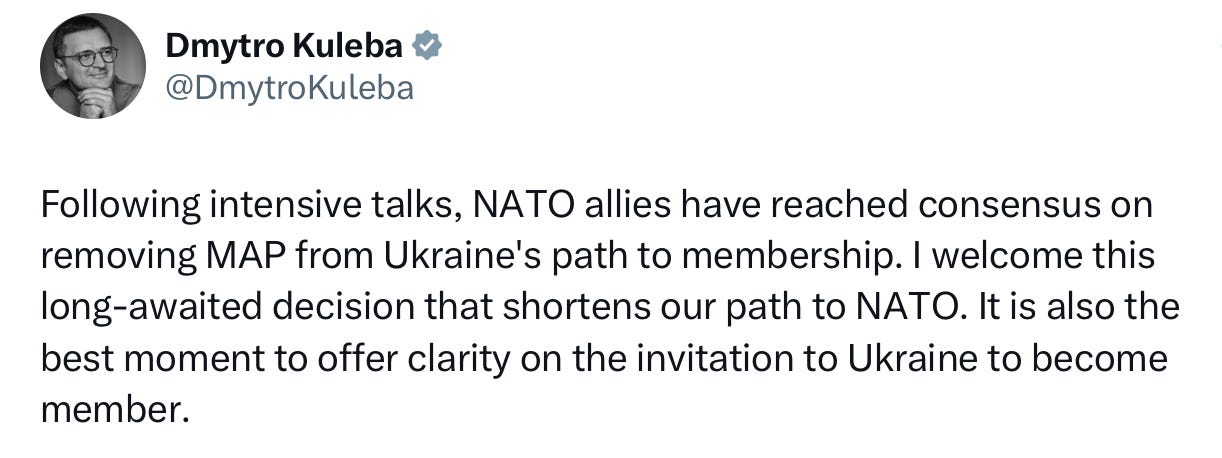🇸🇪 🇹🇷
Turkey has made an abrupt about-face and will now support Sweden’s NATO application. In 11th-hour talks on Monday before NATO’s summer summit begins in Lithuania, Turkish President Recep Tayyip Erdoğan and Sweden’s Prime Minister Ulf Kristersson reached an agreement ensuring Turkish support. The news was announced by NATO Secretary-General Jens Stoltenberg on social media.
Stoltenberg added:
“The memorandum concluded a year ago at the Madrid summit has been delivered. It has delivered more in our fight against terrorism, more security for Türkiye, and a stronger NATO. Sweden’s cooperation with Türkiye in the fight against terrorism will continue beyond accession. NATO will also significantly step up its work in this area, and I will establish, for the first time at NATO, the post of Special Coordinator for Counter-Terrorism. Completing Sweden’s accession to NATO is a historic step that benefits the security of all NATO Allies at this critical time. It makes us all stronger and safer.”
Turkey’s sudden support for Sweden’s NATO membership came as an abrupt about-face from President Erdogan. Earlier on Monday, he appeared to move the goalposts yet again saying that Turkey would not support Sweden’s NATO ascension unless the European Union laid out a clear path for Turkey to join the trading bloc.
Within hours of that bizarre attempt to try and find a shortcut into the EU, Erdogan pulled a U-turn and agreed to support Sweden’s NATO bid and get his parliament to ratify their application as soon as possible.
It appears there were several factors to his sudden change of face. Within an hour of news breaking that Turkey would in fact support Sweden, the U.S. State Department announced it would support the transfer of F-16 fighter jets to Turkey. The United States also announced it would support Turkey’s aspiration to join the European Union. This likely sheds some light on the pressure the United States was applying behind the scenes.
The other more public reason was a new security deal reached on Monday between Sweden and Turkey. The two countries agreed to a new bilateral security compact that will require annual ministerial meetings. At the first such meeting, Sweden agreed to table a roadmap “of its continued fight against terrorism.” Sweden recently introduced a new anti-terrorism law designed to address Turkey’s concerns that it was allowing anti-Turkish militant groups to recruit and fundraise within Sweden.
Sweden and Turkey have also agreed to increase economic cooperation. A Turkey-Sweden Joint Economic and Trade Committee has been struck.
Sweden will also “actively support efforts to reinvigorate Turkey’s EU ascension process.” Turkey was granted ‘EU candidate status’ in 1999 but its membership process has been stalled ever since as it hasn’t met many of the requirements to join the EU including in important areas like democracy and the rule of law.
NATO also agreed to work to end all restrictions, barriers, and sanctions among member nations. This addresses a long-held Turkish grievance that some NATO allies were blocking the sale or transfer of some weapons to Turkey.
-
The reaction was swift as Sweden’s Nordic neighbours celebrated the news.
Denmark’s Foreign Affairs Minister Lars Løkke Rasmussen:
“Just congratulated my Swedish colleague on months of diplomatic efforts, which this evening have cleared the last hurdle in the road for Swedish NATO membership. The entire Nordic region in NATO makes the world safer and creates security in all democracies around the Baltic Sea.”
Norwegian Prime Minister Jonas Gahr Store:
“Historic news for Sweden, Norway, the Nordic region and Nato. We welcome the agreement between Stoltenberg, Erdogan and Kristersson tonight. A united Nordic region in Nato makes the Alliance stronger and our region more secure.”
Finnish President Sauli Niinistö
“I have often said that Finland's NATO membership is not complete without that of Sweden. Now we are one clear step closer to completion. With Sweden, the whole Alliance will be stronger.”
Reaction also poured in from across Europe and from other prominent NATO allies.
President of the European Commission Ursula Von Der Leyen:
“A historic step in Vilnius. I welcome the important step that Türkiye has promised to take, to ratify Sweden’s accession to NATO.”
President of Latvia Edgars Rinkēvičs:
“Very good news, I welcome the decision by Erdogan and hope that the ratification process of Sweden’s accession to NATO will be completed very soon. I thank Turkey, Sweden and Jens Stoltenberg for achieving this result which is important for the security of the whole Alliance.”
Estonia Prime Minister Kaja Kallas:
“Great news before the start of the Vilnius NATO Summit, an important step forward by Türkiye on Sweden’s NATO membership. NATO is getting even stronger. I hope for a rapid ratification and welcoming Sweden as NATO’s 32nd Ally soon.”
UK Foreign Secretary James Cleverly:
“It is in everyone’s interest for Sweden to join NATO. Their accession makes us all safer. The UK welcomes the steps Turkey has taken today to bring this closer. We continue to stand by our Swedish friends.”
U.S. Secretary of State Antony Blinken:
“We welcome Türkiye’s commitment to transmit Sweden’s NATO accession protocols to the Turkish Parliament and work with parliament to secure ratification. Sweden becoming our 32nd NATO Ally will strengthen the NATO Alliance and contribute to European security.”
-
All eyes now shift to Hungary as it has also continued to delay and delay any ratification vote for Sweden’s NATO application. Hungarian Prime Minister Viktor Orbán has consistently said he supports Sweden’s NATO application even as his parliament continuously delays holding a ratification vote.
Sweden can only join NATO if all 31 alliance member nations ratify its application. Turkey and Hungary remain the only two countries that have yet to do so.
-
This amounts to another bad day for Vladimir Putin. One of the Russian President’s reasons for invading Ukraine was to try and keep it from joining NATO and holding the military alliance from growing and hemming Russia in. Since his ill-fated decision, NATO has welcomed Finland into the fold and Sweden is on the cusp of following suit. That not only increases NATO’s presence right on Russia’s doorstep it will also give NATO complete control of the Baltic Sea, the only passageway for Russian naval vessels in and out of major naval bases in St.Petersburg and Kaliningrad.
And it is about to get worse for Putin.
With the NATO summit in Lithuania set to officially begin later today, the big issue on the table is detailing Ukraine’s path to joining the military alliance. Ukrainian Foreign Affairs Minister Dmytro Kuleba says that consensus has been reached to remove the ‘membership action plan’ requirement. This is a list of political, economic and military goals, that nations aspiring to join the alliance must meet.
NATO Secretary General Jens Stoltenberg has already publicly thrown his support behind removing the MAP requirement for Ukraine.
Ukrainian President Volodymyr Zelenskyy has said at the summit he also wants a “clear invitation” from NATO to Ukraine to join the alliance after the war with Russia ends. Ukraine also wants security guarantees in the meantime.
While we will have to wait to see what comes to fruition during the NATO summit we can expect some clarification of Ukraine’s path to NATO. When it eventually does join the alliance, Vladimir Putin’s worst possible outcome will be achieved with NATO alliance countries and its close allies across both his western and eastern borders.







